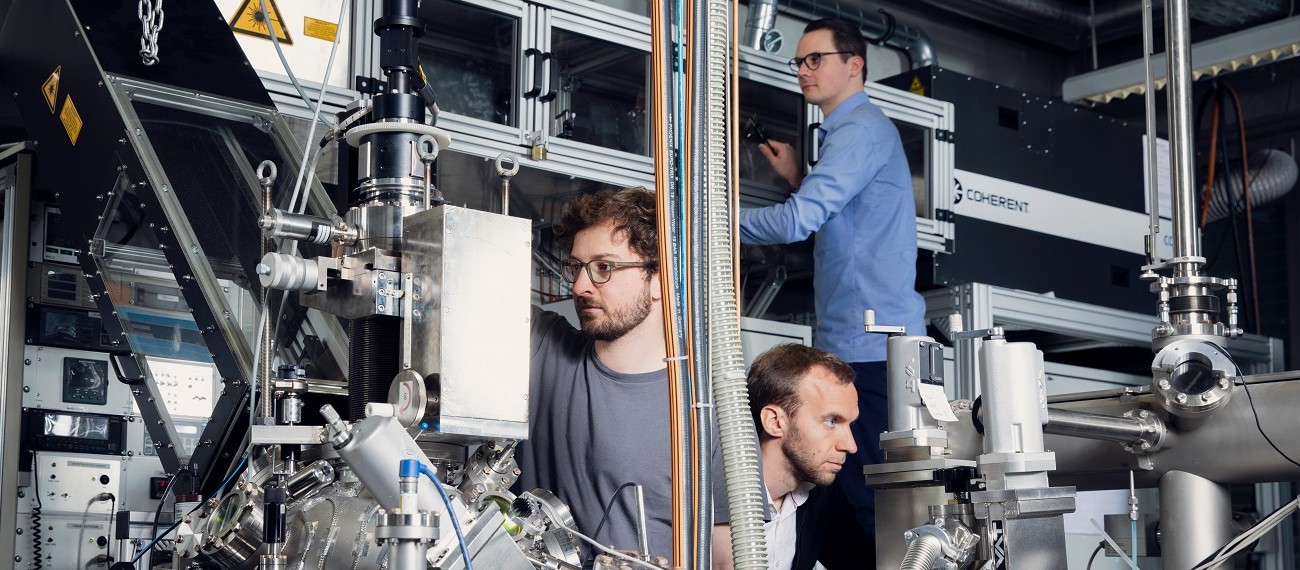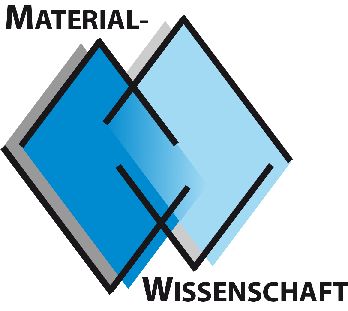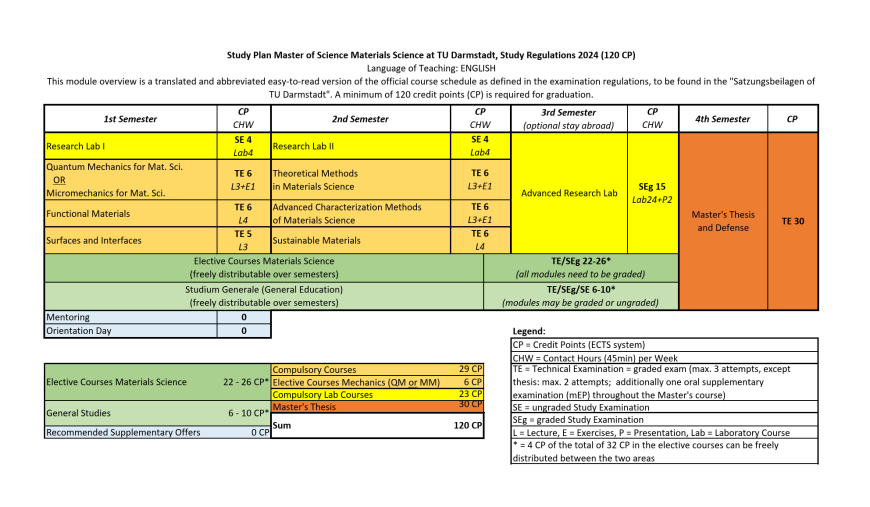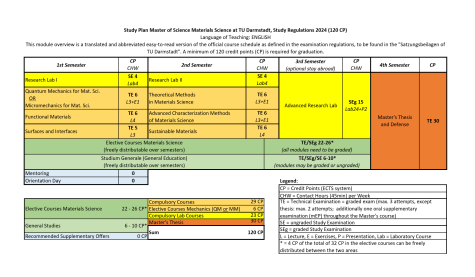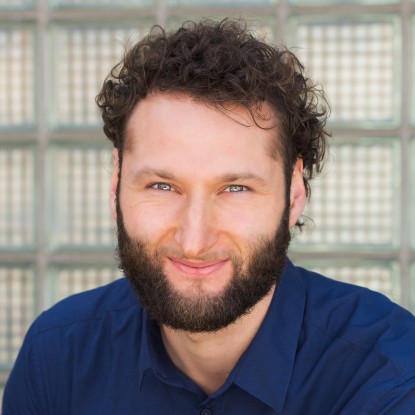Das Wichtigste zu unserem Materials Science Master in Kürze
- Abschluss: Master of Science (M. Sc.)
- 4 Semester Regelstudienzeit (Vollzeit)
- 120 ECTS- Credit Points
- Studienbeginn im Sommersemester & Wintersemester
- Bewerbungsfristen: *
- typischerweise 01.03. (Start zum folgenden Sommersemester)
- typischerweise 31.08. (Start zum folgenden Wintersemester)
- Unterrichtssprache: Englisch
- Zulassungsfrei (d.h. keine begrenzte Platzzahl)
- Voraussetzungen: *
- B.Sc. in verwandter Fachrichtung
- Englisch C1-Level
- Teilnahme am OSA
*: für Details siehe Q8 in unseren „FAQ Application and Admission“
Dein Studium: Praxisnah und international
In unserem Master-Programm dreht sich alles um ein tiefgreifendes Verständnis von Materialeigenschaften und deren Beeinflussbarkeit. Am Ende des Studiums wirst du in der Lage sein, maßgeschneiderte Materialien für bestimmte Anwendungen zu entwickeln. Im Fokus stehen dabei Hightech-Materialien, die unsere Zukunft prägen – etwa in der Energieversorgung, der Elektronik oder der Medizintechnik.
Hierfür vertiefst du bei uns dein Wissen über Funktionsmaterialien, Grenzflächen und Nachhaltige Materialien. Darüber hinaus schärfst du deine Skills in den Bereichen Materialanalytik, Synthese und Modellierung/Simulation. Und all das nicht nur theoretisch: in jedem Semester sind Praxismodule vorgesehen, die dich direkt in unsere Forschungsgruppen führen. So wirst du ideal auf dein Forschungsprojekt für die Masterarbeit vorbereitet.
Damit nicht genug: Mit über 50 Wahlkursen unseres Instituts und unzähligen weiteren von anderen Fachbereichen der TU, kannst du deine Spezialisierung individuell gestalten. Unsere Profs helfen dir dabei, dich zurechtzufinden und beraten dich auch darüber hinaus in unserem Mentoring-Programm.
Die Lehre in unserem Master findet vollständig auf Englisch statt. Dadurch schaffst du dir ideale Voraussetzungen für eine internationale Laufbahn in einem zukunftsträchtigen Arbeitsfeld mit besten Karrierechancen. Unsere Absolvent:innen sind Expert:innen, die weltweit in der akademischen und industriellen Forschung & Entwicklung gesucht werden.
Rund ums Studium
Pflichtveranstaltungen (Vorlesungen, Übungen, Laborpraktika):
- Es werden Inhalte in den Bereichen Funktionale Materialien, Oberflächenforschung und Quantenmechanik oder Mikromechanik vertieft. Theoretische Methoden und Charakterisierungsmethoden erweitern die methodischen Kompetenzen der Studierenden. Im Modul Sustainable Materials wird das Ersetzen kritischer Rohstoffe sowie das Recycling von Materialien behandelt.
- In zwei Laborpraktika wird die praktische Arbeit vertieft und in der zweiten Studienhälfte wird mit dem Advanced Research Lab über drei Monate ein Projekt in einer der Forschungsgruppen bearbeitet.
Der über das Studium verteilte Wahlpflichtbereich (WPB) bietet großen Spielraum für die individuelle Ausrichtung und teilt sich in zwei Bereiche auf:
- Materialwissenschaftlicher WPB: z.B. Fundamentals and Technology of Solar Cells, Ceramic Materials: Synthesis and Properties (I & II) oder Transmission Electron Microscopy.
- Studium Generale: z.B. Sprachkurse oder Projektmanagement.
- Hierbei können bis zu 4 CP frei auf beide Wahlpflichtbereiche verteilt werden.
In der Masterarbeit wird schließlich über 6 Monate ein Projekt in einer der Forschungsgruppen bearbeitet.
Finde heraus, ob unser Materials Science Master die richtige Wahl für dich ist – mit unserem kostenlosen und anonymen Online Self Assessment (OSA)!
Starte direkt dein OSA-Materialwissenschaft und erhalte einen realistischen Einblick in das Studium: Erwartungen, Inhalte und Anforderungen – ganz einfach online.
Hinweis:
Alle Bewerber müssen Teil 2 unseres OSAs abgeschlossen haben.
Zu diesem Zweck wird am Ende des Assessments eine Teilnahmebescheinigung ausgestellt. Bitte beachte, dass es sich um ein Self Assessment und nicht um eine Aufnahmeprüfung handelt. Niemand außer dir wird Informationen über die Ergebnisse erhalten.
In nahezu allen Wirtschaftsbereichen besteht ein enorm hoher Bedarf an Werkstoffen, die immer komplexere Anforderungen erfüllen müssen. Deshalb sind Materialwissenschaftler*innen weltweit und in diversen Branchen gefragt: In der Energiebranche, dem Automobil- und Flugzeugbau, der Halbleiterindustrie, der Biotechnologie und, und, und. Überall bedarf es vieler gut ausgebildeter Materialwissenschaftler*innen, die die Beziehung zwischen Material und Funktion verstehen und sich in der Schnittmenge zwischen den klassischen Wissenschaftsdisziplinen zurecht finden. Genau dieses interdisziplinäre Know-how von MaWis ist aber nicht nur in der Forschung und Entwicklung, sondern auch in anderen Bereichen gefragt, etwa in der Unternehmensberatung, bei Versicherungen, im Journalismus u.v.m.
In euch stecken Unternehmer*innen? Viele der Forschungsergebnisse lassen sich direkt anwenden und haben Potential für neue Produkte. Dem Start-up steht also nichts im Wege! Zum Beispiel sind Materialwissenschaftler der TU Darmstadt dabei, den Energiesektor mit nachhaltigen Kühlschränken und Klimaanlagen zu revolutionieren!
Übrigens befindet sich die TU Darmstadt mitten im „Materials Valley“. So bestehen schon früh im Studium unzählige Möglichkeiten, zu potentiellen Arbeitgebern Kontakt zu knüpfen.
Falls im Studium euer Forschergeist geweckt wird und ihr noch tiefer in die Wissenschaft einsteigen wollt, ist es eine gute Idee zu promovieren. Zum Beispiel in einem der vielen Forschungsprojekte am Fachbereich Materialwissenschaft.
Bewerbung und Zuständigkeiten
Die offiziellen Bewerbungsfristen für alle Masterstudiengänge der TU Darmstadt werden auf dieser zentralen Website veröffentlicht. Nur die Informationen auf dieser Seite sind rechtsverbindlich.
In der Regel sind die Bewerbungsfristen wie folgt:
01.06 – 31.08. für die Zulassung zum folgenden Wintersemester.
01.12 – 01.03. für die Zulassung zum folgenden Sommersemester.
Für internationale Bewerber für den M.Sc. Materials Science gelten zusätzliche early-bird Fristen:
01.03 – 30.05. für die Zulassung zum folgenden Wintersemester.
01.09 – 30.11. für die Zulassung zum darauf folgenden Sommersemester.
Voraussetzung für die Zulassung zum M.Sc. Materials Science ist ein Bachelor of Science der TU Darmstadt in Materials Science oder ein gleichwertiger Abschluss.
Wir erwarten ein Grundwissen in den Grundlagen der Materialwissenschaft. Dies beinhaltet ingenieurwissenschaftliche Elemente, geht aber darüber hinaus. Insbesondere werden Kenntnisse über Halbleiter, Funktionskeramiken, Metalle und physikalische Chemie einschließlich Quantenmechanik vorausgesetzt.
Bewerber mit einem Bachelor-Abschluss in verwandten Fächern wie Physik oder Chemie werden ausdrücklich aufgefordert, sich zu bewerben.
Werkstoffingenieure mit einem starken Schwerpunkt in der Werkstoffkunde können ebenfalls berücksichtigt werden. „Starker Schwerpunkt“ bedeutet, dass Sie zusätzliche Wahlfächer in Materialwissenschaften belegt haben.
Bewerber mit einem ausgeprägten ingenieurwissenschaftlichen Hintergrund – insbesondere Maschinenbau-, Luftfahrt-, Automobil-, Chemie-, Elektro-, Petrochemie-, Verfahrens- und Textilingenieure – können nur in Ausnahmefällen zugelassen werden. Die Zulassungskommission kann von den Bewerbern verlangen, dass sie zusätzliche Kurse besuchen, um eine ausreichende Gleichwertigkeit zu erreichen.
Alle Bewerber müssen Teil 2 unseres Online Self Assessments (OSA) absolviert haben. Zu diesem Zweck wird am Ende des Assessments eine Teilnahmebescheinigung ausgestellt. Bitte beachten Sie, dass es sich um ein Werkzeug zur Selbsteinschätzung und nicht um eine Aufnahmeprüfung handelt. Niemand außer Ihnen erhält Informationen über Ihre Ergebnisse.
Bitte haben Sie Verständnis dafür, dass wir keine Vorprüfung der Eignung vornehmen können. Um Ihre Chancen auf eine Zulassung einzuschätzen, lesen Sie bitte ausführlich unsere FAQ , insbesondere Q7.
Der M.Sc. Materials Science wird in englischer Sprache unterrichtet. Um zum Studium zugelassen zu werden, verlangt die Studienordnung Englischkenntnisse mindestens auf UNIcert III Niveau (C1). Weitere Informationen, insbesondere zu Nachweisen, die dem UNIcert gleichwertig sind, finden Sie unter Q10 in unserem FAQ-Bereich.
Der Studiengang wird ausschließlich auf Englisch unterrichtet. Es sind keine deutschen Sprachkenntnisse erforderlich.
Bewerbungen von Studierenden mit deutscher Hochschulzugangsberechtigung werden vom TU Studierendenservice bearbeitet.
Bewerbungen von Studierenden mit internationaler Hochschulzugangsberechtigung werden vom TU Office for International Admission bearbeitet.
Dies Einheiten sind für alle Formalitäten des Bewerbungs- und Zulassungsverfahrens zuständig und geben verbindliche Auskünfte (z.B. zu erforderlichen Unterlagen, Sprachanforderungen, Bewerbungsfristen und -terminen). Bei allen Fragen zu Formalitäten des Bewerbungsverfahrens wenden Sie sich bitte an die für Sie zuständige Stelle.
The M.Sc. Materials Science aims at enabling students to research and develop next-generation materials. Therefor, natural sciences are at the heart of the programme.
Our courses focus on structure, synthesis, analysis, and properties of structural and functional materials such as ceramics, inorganic and organic semiconductors, thin films, energy materials, metals or nanomaterials.
Compulsory courses cover fundamental aspects such as quantum mechanics of materials, functional materials, surface science, theoretical methods in materials science, materials characterization and sustainable materials.
A wide range of elective courses provides further insight into specialized topics. For your Master thesis, you will join one of the Research Groups at the department.
For more details, see the module handbook and accompanying material in our download section.
We expect a background in Materials Science that is comparable to a B. Sc. in Materials Science at TU Darmstadt. For instance, successful applicants hold Bachelor's degrees in Materials Science, Physics, or Chemistry, or in particular cases some engineering degrees (if a sufficient focus on natural sciences is discernible).
Since specific contents of study programmes may vary largely between universities the decision on admission strongly depends on the individual background, skills and academic achievements. For further details, please see Q5 & Q7.
We strongly encourage you to asses your individual proficiency for our Master's programme(s) with the help of our Online Self Assessment tool (free and anonymous).
We will be happy to receive your application. Please make sure that you provide all requested documents. Your application will be evaluated as detailed in Q5.
We will be happy to receive your application. Please make sure that you provide all requested documents. Your application will be evaluated as detailed in Q5. To estimate your chances, please have a look at Q7.
It is very important that you demonstrate your qualifications in Materials Science in your documents with e.g. certificates for lab internships, relevant elective courses (e.g. in solid state physics/chemistry, solid synthesis, corrosion, tribology, electrochemistry, nanomaterials, biomaterials, …), and – if applicable – the title of your B. Sc. thesis.
We will evaluate your application in a multi-stage process. First, your documents will be checked formally by the TU Office for International Admission(in case of international university degrees) or the Central Study Office (German university degrees). Here, the validity of all certificates as well as the English language proficiency (see Q10) are checked. Secondly, the department evaluates the academic background of your B.Sc.:
- Direct admission will be granted if the previous academic achievements correspond to a B.Sc. in Material Science at TU Darmstadt (see Q7).
- Additional conditions can apply, e.g. you may be obliged to register for adjustment courses (see Q12). Admission may also be granted with the reservation that further examinations have to be passed within a deadline, which will be issued by the Examination Committee. If the student fails these examinations, admission to the Master’s programme and registration at TU Darmstadt may be revoked.
- In case of partial equivalence and good academic qualifications, the candidate can be invited to an entrance examination (third stage). This examination can be a written test, an interview or both, taking place at TU Darmstadt. For candidates from overseas, we can offer a telephone/online interview. (For this occasion, please make sure that your technical equipment is up to date and working). Admission will then be based on the outcome of the test.
- In case of admission, additional conditions may apply, e.g. you may be obliged to register for adjustment courses (see Q12). Admission may also be granted with the reservation that further examinations have to be passed within a deadline, which will be issued by the Examination Committee. If the student fails these examinations, admission to the Master’s programme and registration at TU Darmstadt may be revoked.
- In case of insufficient qualifications, we regret that we have to reject the application. “Insufficient qualifications” means it is not to be expected that you will be able to make up for the missing contents and graduate successfully in a reasonable amount of time.
Letters of recommendation will not be considered.
A letter of motivation can be helpful in deciding about your admission. Please state in your letter on which topics (elective courses) you plan to focus during your studies at TU Darmstadt, how this matches your previous education, and how the M.Sc. programme fits into your career plans. You can also tentatively state in which area you plan to specialize during your Master thesis. Please refer to the module handbook (see our download section) and the list of research groups in order to find out more about potential specializations. Your letter should provide a sketchy overview of your planned studies. (Should you intend to include courses of other departments at TU Darmstadt, please be aware that most courses are taught in German language.) Of course, this first study plan may be refined and adjusted later on. Once admitted, you will work on your study plan together with your mentor.
Hint: It is neither necessary nor helpful to praise Germany, Darmstadt, TU Darmstadt, or our department in any way. Your application in itself reflects your positive acclaim and is appreciated as such.
We expect a background in Material Science equivalent to the B.Sc. programme at TU Darmstadt. The following list provides an overview of expected skills. 1 CP means 1 credit point in the European Credit Transfer System (ECTS).
- Mathematics (24 CP)
Understanding and command of Linear Algebra, Fundamental Analysis, and Engineering Mathematics (ODE, PDE). - Natural Sciences (30–40 CP)
Understanding and command of Introductory General Chemistry, Experimental Physics, Physical Chemistry (Thermodynamics, Quantum Chemistry of atoms and simple molecules, spectroscopy). - Engineering (optional 10-15 CP)
Understanding and command of Continuum Mechanics and elementary Electrical Engineering. - Fundamental Materials Science (25-35 CP)
Introductory knowledge on all classes of materials.
Understanding and command of:- Solid structure, thermodynamics, properties and defects
- Solid state analytics (e.g. scattering, spectroscopy, EM, electronic testing)
- Advanced Materials Science (45-60 CP)
Understanding and command of:- Defects
- Physical metallurgy
- Solid state physics
- Introductory numerical methods in materials modeling
- Advanced solid state analytics
- Bachelor thesis on a materials related topic (15 CP)
Your background will be compared with this list. Particularly decisive for the admission is that your graduation can be expected within a reasonable amount of time. This means that your skills, grades, and letter of motivation will be assessed. As a successful applicant, we expect that you will not lose more than one semester trying to catch up with our Masters' content.The final decision will be based on your individual documents. In many cases, it is difficult to assess from the transcript to which extent materials related topics have been taught in natural science or engineering courses. In case of doubt, please provide a module description or a link to the module description of your previous institution and the topic of your B.Sc. thesis in your cover letter.
If you have your documents ready, please apply as early as possible within the given application window.
The official application deadlines for all Master's programme at TU Darmstadt are published on this central website. Only the information on this site is legally binding.
Typically, application windows are as follows:
- 01.06 – 31.08. for admission to the subsequent winter semester.
- 01.12 – 01.03. for admission to the subsequent summer semester.
For international applicants to the M.Sc. Materials Science, additional early-bird application windows apply:
- 01.03 – 30.05. for admission to the subsequent winter semester.
- 01.09 – 30.11. for admission to the subsequent summer semester.
This serves, for example, for the application for a visa or for submission to the Foreigners' Registration Office.
Please note, that even though the early-bird window seamlessly connects to the regular window, these are technically two different application time-frames. If you begin filing your application on TUCaN in the early-bird window, you will have to submit it before the early-bird window closes, otherwise you will have to start over again.
The application procedure takes a long time (typically 6-8 weeks) from receipt of your application to the admission decision. Each application must run through a formal check and then be reviewed by us (entrance requirements verification). We therefore recommend that you apply early in order to ensure timely enrolment in the event of admission. Also, we often experience a rush just before the deadline, resulting in delays.
Case 1: Your application has to proceed through the International Admission office (i.e., your qualification for university entrance was obtained at a non-German school outside of Germany or at an international school within Germany). Then the deadline is strict and your application will only be considered if the International Admission office of TU Darmstadt decides that it is complete. This includes proof of English language skills. If the final graduation certificate is still missing, at least a provisional certificate stating the fulfillment of all requirements for your degree needs to be included. If your application is received too late or considered incomplete, it will be turned down by the International Admission office and you need to reapply if you are interested to join our Master course at a later date.
Case 2: Your application proceeds through the Student Services/Office of Student Affairs (i.e., your qualification for university entrance was obtained through a German school in Germany or a German school abroad). Then the deadline is still strict but you may apply even if your documents are still incomplete (e.g. still some grades are missing because exams are not yet graded or your supervisor has not yet looked into your B.Sc. thesis) and you hand in final documents as soon as possible.
The M.Sc. Materials Science is taught in English. To be accepted for the study programme our regulations ask for knowledge of the English language at least on a UNIcert III level (C1). For equivalent proofs (TOEFL, TOEIC or similar) please consult the official list of the TU Sprachenzentrum (wird in neuem Tab geöffnet). Also note the possibility of proving that your Bachelor's (or previous Master's) medium of instruction was English.
As with any other formal question, please contact the TU Office for International Admission in case of doubt.
No German language skills are necessary (and thus no German language certificate is needed).
You need the usual documents plus a transcript, which certifies that you did not finally fail in your current course. In German: “Prüfungsrecht besteht”.
An adjustment course is an obligatory course you have to take instead of an elective course. The idea behind adjustment courses is to give you the opportunity to catch up with essential topics in Materials Science you may not have had in your B.Sc. programme. You may have to take adjustment courses up to 20-25 CPs.
No. With the study regulations 2024, entering into force on 01.06.2024, having completed an industrial internship is longer an admission requirement.
We offer admission for both winter and summer semester. However, mandatory courses of the first semester are only offered during the winter semester. They are an essential basis for all subsequent courses. Thus, we strongly recommend international students and transfer students from other German universities to start in the winter semester.
Credit points from earlier Master-level achievements will transfer only if the contents of the courses are equivalent to those classes offered within the Master’s programme Materials Science at TU Darmstadt. The Examination Board decides on each request individually.
For this we need a list from you that clearly states which of your previous Master’s courses correspond to which of our Master’s modules and how many ECTS are supposed to be acknowledged. Please, send this list along with the Transcript of Records to the Chair of our Examination Board after receiving your Letter of Admission.
Hint: A list of modules that are contained in our M.Sc. program can be found in our Module Guide (wird in neuem Tab geöffnet)(Please also look in TUCaN for more “Elective Courses Materials Science” than are listed in the module guide for study regulations 2024). This overview (wird in neuem Tab geöffnet) might also be useful for you as it provides a first sight overview of how many ECTS (= Credit Points, CP) are required in each module.
Please note that credit points cannot be transferred from a Bachelor course that qualified you for admission to the Master's course in Materials Science at TU Darmstadt, even if the total number of credit points of your Bachelor course exceeds that of a Bachelor course in Materials Science at TU Darmstadt.
All freshers will receive an email invitation to a departmental kick-off event, which takes place right before the start of each semester. At this event, the Office for Student Affairs and the Fachschaft (Student Council) present information on studying at TU Darmstadt in general and the M.Sc. Materials Science, specifically. The email invitation also includes a booklet with basic information on living and studying in Darmstadt.
Furthermore, the Departmental Students' Representative Committee offers a Master Integration Week during winter semester as well as an “Orientation Week” (in German) for beginning Bachelor students, but you are more than welcome to join in!
The International Admission office sends your application list to one department at a time, according to your list of preferences. If you did not provide such a list, the International Admission office will make the decision.
You can check the current fees on TU Darmstadt's Semester Fee website.
Note, that merely administrative fees are incurred, no tuition fees are levied for studying at TU Darmstadt.
For information on the possibilities of financial support for your studies at TU Darmstadt, please read Q21.
Please contact the International Admission office. They are the sole authority that can answer these questions as they decide about the formal completeness of your application before sending it to our department. Please note that the International Admission may be very busy and answers may be delayed during deadlines of applications.
Due to the large number of applicants, we are unfortunately not able to offer this service. Please check the answers to the other questions in order to estimate your chances.
Our basic Master's programme (the M.Sc. Materials Science) itself does not come with a student grant or scholarship. However, it is important to note that there are no tuition fees either. You would only have to face a semester fee (to-date approx. €380, subject to change, see Q18) and of course the ordinary costs of living.
Some of our International Double Degree Programmes do include a scholarship.
Also, there are other grants/scholarships that you can apply for (e.g. the Deutschlandstipendium or a TU Darmstadt specific scholarship supporting students in the final phase of their studies). The TU Darmstadt International Student Services has collected details on these programmes and further opportunities on their website about the matter of financing your studies.
Please contact the Studierendenwerk or the TU International Student Services.

